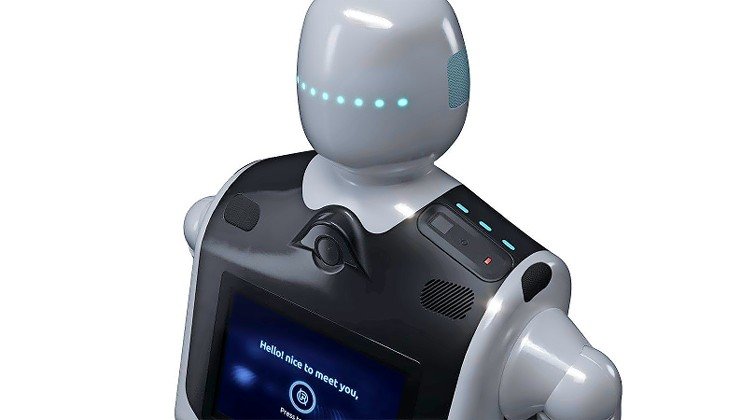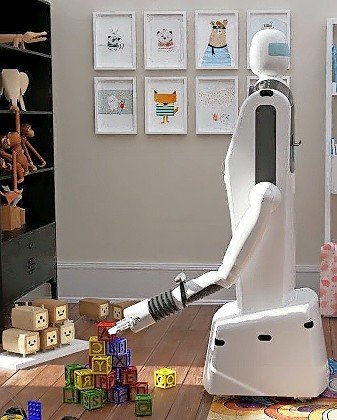Meet Gary, Israeli robot who can pick up toys, do laundry
He’s about the height of Dobby the house elf from the Harry Potter books. And he never balks at taking on a repetitive or boring task. He doesn’t mind cleaning toilets, picking up socks or moving packages in a warehouse.
His name is Gary and he’s a robot for your home or business.
The height of a 10-year-old, with a speed of 3.1 miles per hour and a weight of about 88 pounds, Gary is coming in early 2022 from Petah Tikva-based startup Unlimited Robotics.
Gary is currently “naked,” explains Guy Altagar, cofounder and CEO of Unlimited Robotics. This doesn’t mean Gary has no clothes (although he doesn’t) but rather that the robot hasn’t yet received all his programming instructions.
But that will soon change, as developers begin to create apps for Gary, who got his name from the initials of Altagar’s three children — Gali, Rani and Yaeli.
Despite that playful backstory, Gary is not intended to be cute.
Indeed, Gary wasn’t designed to play your favorite tunes on demand or to connect a video call to your grandkids. Instead, At home, he could remove dirty towels from the laundry basket and put them in the washer, water the plants, load the dishwasher and open jars. In a restaurant, he could serve food or greet customers at the door. In a hotel, he could strip the bedsheets or replenish the shampoo and conditioner.
Gary can carry up to 11 pounds in his two robotic arms. His sensors and cameras include one to take a 3D view of a room and an infrared camera to see in the dark.
Gary is available for pre-order from the Unlimited Robotics website. He doesn’t come cheap at $5,900 but already 80 people have paid the $99 fee to reserve a spot on the waiting list.
While plenty of other companies are developing robots (Boston Dynamics has an industrial use robot, Spot), what sets Unlimited Robotics apart is its “app store” for robots.
You want a new function for Gary? Just download it and you’re all set. If a developer chooses to charge for its app, Unlimited Robotics will take a 30 percent cut.
Unlimited Robotics is providing tools that allow any programmer to create apps without having to learn robotics-specific software. If a developer uses Python or JavaScript, for example, Unlimited Robotics’ Ra-Ya platform (named after Altagar’s mother, Raya) will translate that code to work on its robotics hardware.
Being able to seamlessly translate from one language to another “opens huge opportunities for software developers to build applications not just for the web or mobile, but for robots, too,” Altagar says.
When a Gary first comes to your home or business, he’s somewhat of a blank slate. An app may tell him what to do in broad strokes, but he needs some personal orientation.
“The host will teach Gary,” Altagar says. “He’ll explain to Gary which room is the bedroom and where the socks are that need to be picked up. After the first interaction, Gary will ask for feedback. The host will explain to Gary what he did that was good or bad and Gary will improve for the next time.”
Gary’s a sociable guy — whatever he learns in your house or facility, he’ll share with all the other Garys connected via the Internet.
“Mapping your particular house may not be relatable to other users but understanding what a sock is or the optimal way to pick it up, or how to hold a cup of coffee, is something that can be shared,” Altagar says.
Gary is not a real-world version of Rosie from the Jetsons. In fact, the robot was intentionally designed as a male, Altagar tells ISRAEL21c. “We didn’t want to create an approach where a woman is ‘serving’ a family.”
Altagar doesn’t have a robotics background (he studied law and economics at Tel Aviv University and launched a mobile gaming startup). Although that company didn’t succeed, Altagar’s entrepreneurial spirit had been kindled.
The impetus for Gary was to help firefighters.
“In 2019, there were a lot of fires, in California and in Israel,” Altagar says. “The only solution was to send up airplanes to release water. We thought, could we create a robot to enter into the heart of the fire and release water and other materials there?”
Gary the fireman proved to be a tad more ambitious than Altagar was ready to take on.
“But with three little kids in my house, leaving their toys everywhere and my back breaking from picking up their mess, this is where the idea came from.”
Altagar teamed up with Dr. Eli Kolberg from Bar-Ilan University’s faculty of engineering, and Martin Gordon, today the company’s chief technology officer and chief product officer, respectively. The company employs 26 people — 22 in Petah Tikva and the others in Colombia and Georgia.
Unlimited Robotics raised seed money from Wix CEO Avishai Abrahami and is finalizing a $15 million Series A funding round.
While Gary is not meant to put anyone out of a job, he is debuting at a time when many industries, from restaurants to hospitality, are having a hard time finding staff.
“We are on the edge of entering into a new era in which machines and mankind will be living together,” Altagar says. “Robots are already in our warehouses and our logistics centers, where people don’t see them. We believe robots will move closer in proximity to humans in the next year or two.”
Could Gary be hacked? Altagar insists Unlimited Robotics is “using the best security measurements we can find.”
And Gary will not listen to your conversations (like Amazon’s Alexa) or take pictures without your permission. He’ll come with a hood that you can place over his head to guarantee he’s not watching or recording.
Tesla CEO Elon Musk gave the whole field of personal robotics a boost in August when he revealed that the electric car manufacturer is working on a “Tesla Bot,” a humanoid robot designed — like Gary — to handle “tasks that are unsafe, repetitive or boring.”
“That made people start to pay more attention to this industry,” Altagar says.

 61.0°,
Mostly Cloudy
61.0°,
Mostly Cloudy 







